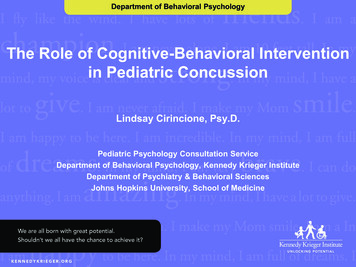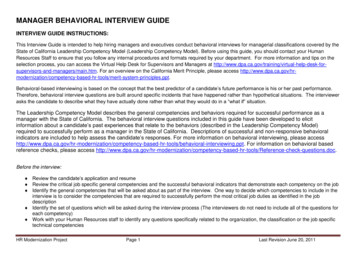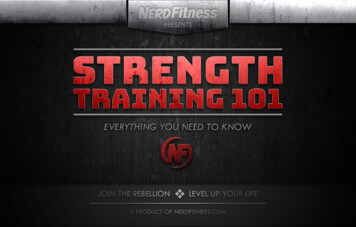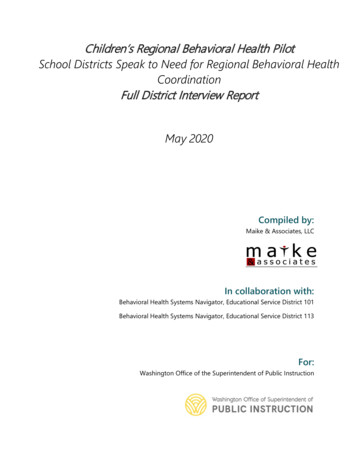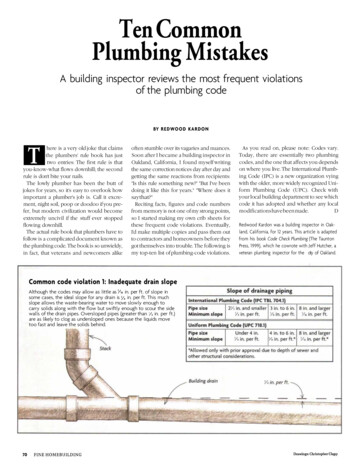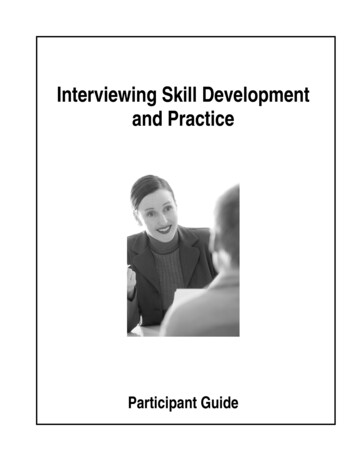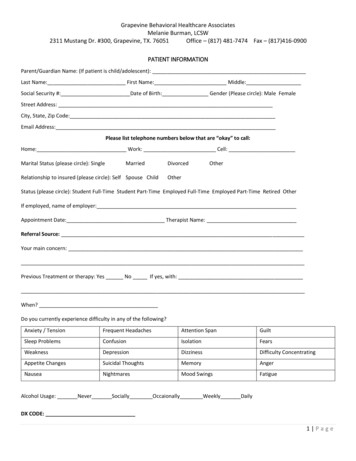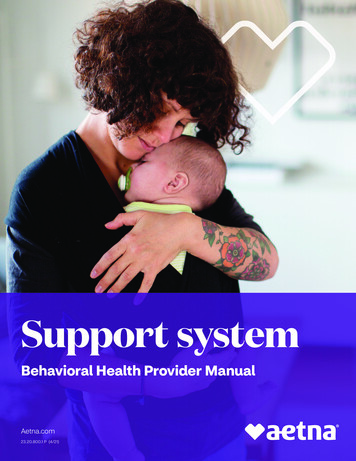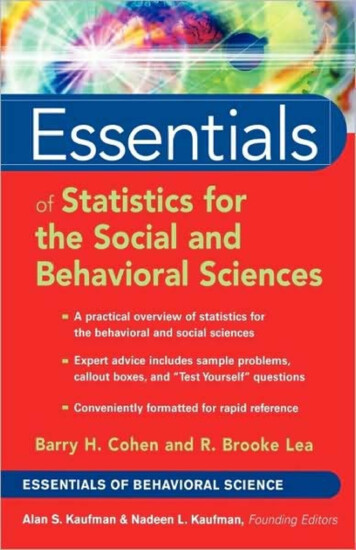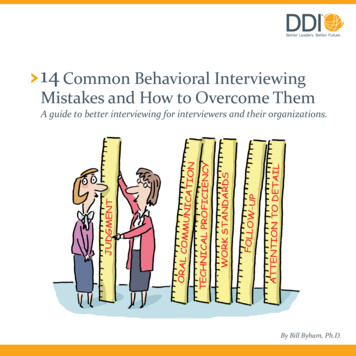
Transcription
14 Common Behavioral InterviewingMistakes and How to Overcome ThemA guide to better interviewing for interviewers and their organizations.By Bill Byham, Ph.D.
The Interview: A High-Stakes“First Date”An interview is like a first date, in that both participants—candidate and interviewer—want to make theirbest-possible first impression.the “real person”—and if the person is worth investingadditional time to get to know better.Of course, for either a date or an interview to go well,both parties need to draw on good communicationand listening skills, compatibility, and more than alittle bit of preparation. For a date, your preparationwould likely focus on picking out the right outfit towear (same for an interview, actually), suggesting theperfect movie or restaurant, and thinking through thestories you may or may not want to tell about yourself(that sounds a lot like an interview, too). Similarly, asyou prepare to conduct an interview, you will need tocarefully review any information you have on the candidate, determine the information you’ll seek to gatherand share during the interview, and consider the rightquestions to ask.But consider how technology has transformed dating.Now, that first meeting is often preceded by a “firstimpression” made online, via social media or datingsites that make it possible to gather more informationabout—or even screen out—a “candidate” beforemeeting face-to-face.Technology has transformed job interviews in thesame way. Except, the exchange of informationdoesn’t happen on dating sites, but via LinkedIn,Glassdoor, job boards, online screening tools, anda company’s own website.While it might be tempting to think technology, andthe free flow of information it has enabled, has madeboth dates and face-to-face meetings less important,the opposite is true. It’s now possible to gather a largebody of information on an individual (and, in turn, for anindividual to share or reveal a great deal of informationabout himself or herself). That means meeting faceto-face is the only way to determine how much of thatinformation is accurate—if the profile the individual hasconstructed in cyberspace is accurate and reflectsUnfortunately, too often interviewers don’t prepare atall, as they mistakenly believe it’s the candidate, and thecandidate only, who needs to make a good impression.This couldn’t be further from the truth when desirablecandidates may have multiple employment options.And what’s more, candidates are also able to do theirown online research on the job, the company, and itsreputation as a place to work.Dr. William C. Byham developed the first behavior-based interviewing system, Targeted Selection , in 1970. The TargetedSelection interviewing system, which Bill has continuously updated and improved, is used by more than 10,000 organizations,including many of the world’s largest. Development Dimensions International, Inc., 2019. All rights reserved.2www.ddiworld.com/targetedselection
And if, through poor interviewing, you hire the wrongperson? That can be even more expensive. ERE Mediaestimates that turnover can cost an organization anywhere from 30 to 50 percent of the annual salary toreplace an entry-level employee and as much as 400percent of the salary of a high-level or highly specializedemployee. Indeed, an interview can be a particularlyhigh-stakes “first date.”What Can Go Wrong?In fact, it’s never been more important for interviewersto be prepared for a productive conversation, to putOne of the most important things an interviewer cancandidates at ease, make sure they have a positivedo to prepare for an interview is become aware of theexperience, and to sell candidates on the job andcommon mistakes made by interviewers—includingthe organization.themselves. That’s where this guide can help.For a behavioral interview, preparation is even moreWhat follows are 14 behavioral interviewing mistakesimportant. In a behavioral interview the intervieweryou need to anticipate and strive to avoid. Alongmust understand how to seek specific, job-relevantthe way, we’ll offer insights to help you become aexamples of the candidate’s past behavior in situationsmore informed and better interviewer.similar to those in the job being filled. (BehavioralWe’ll also share how an effective, repeatable interview-interviewing is based on the belief that past behavioring process will minimize or eliminate many of thesepredicts future behavior.) Once this data is collected,mistakes. But first, let’s get to what can—and oftenthe interviewer also needs to understand what to dodoes—go wrong.with it to make the best hiring decision.According to SHRM, the average cost per hire foremployers is more than 4,400 and the average timeto hire a new employee is 36 days—underscoring thatinterviewing is an expensive activity.www.ddiworld.com/targetedselection3 Development Dimensions International, Inc., 2019. All rights reserved.
Ask for specific examples—what the candidate actuallydid—not what they theoretically would do. Development Dimensions International, Inc., 2019. All rights reserved.4www.ddiworld.com/targetedselection
Common Interviewing MistakesMistake #1: Failing to interviewfor behavior.Selection processes need to be based on specific,As past behavior predicts future behavior, it’s criticalaccurately defined, and well-documented essential jobthat interviewers probe for specific examples—what therequirements (in the United States, it’s a mandate ofcandidates actually did in specific situations, not whatthe U.S. Equal Employment Opportunity Commissionthey theoretically would do or should do. When inter-(EEOC)). In most organizations, these requirements areviewers fail to ask questions that prompt the candidatedefined through the job competencies identifiedto provide this critical information, they limit theiras being required for job success.understanding of the candidate’s potential for success;Even when competencies are clearly defined and docu-they won’t be able to determine how the candidatemented, however, research has shown that experiencedwould behave in the job.interviewers become complacent: They ask the samequestions repeatedly or focus on a few competenciesthat are easy to evaluate instead of the most importantcompetencies.By taking shortcuts with their questioning, interviewerscan also short-circuit the most important purpose of abehavioral interview: interviewing for behavior.NEARLY TWO-THIRDS OF INTERVIEWERS WORRYABOUT MISSING INFORMATION ABOUT CANDIDATEWEAKNESSES.- DDI RESEARCHwww.ddiworld.com/targetedselection5 Development Dimensions International, Inc., 2019. All rights reserved.
Trying to determine a candidate’s underlying personality traitsto establish job motivation is playing amateur psychiatrist.
Common Interviewing MistakesMistake #2: Misinterpreting informationthe candidate shares.Several practices can cause an interviewer to misinterpretviewer will be persuaded by a candidate’s ability toinformation the candidate shares, including the following:effectively sell himself or herself.Playing amateur psychiatrist. An interviewer who triesProjecting personal attitudes, motives, and feelingsto determine a candidate’s underlying personality traitsonto a candidate. Consider an interviewer who is highlyto establish job motivation is playing amateur psychi-motivated and achievement-oriented. If this intervieweratrist. So too is an interviewer who asks candidateslooks for similar characteristics in every candidate, he orto describe themselves in a sentence or to share theirshe may misinterpret candidate responses by making as-strengths or weaknesses. Because most hiring man-sumptions based on his or her own personal perspective.agers are not trained in this approach, they can easilymisinterpret candidate responses.In addition, interviewers who project their own attitudes,motives, and feelings often fail to ask follow-up questionsAsking theoretical questions. As alluded to above,and instead assume information that is not given. Forwhen interviewers ask what the candidate would orexample, an interviewer might assume a candidate whoshould do instead of asking what the candidate did,reports receiving excellent grades in college is highlythey fail to obtain concrete examples of actual pastmotivated or is a hard worker. This interviewer is notbehavior. What’s more, relying on theoretical informationinclined to ask additional questions; if he or she had,leaves responses open to interpretation. This can leadthe candidate’s responses might reveal that the goodto a false impression of a candidate’s abilities. Askingmarks resulted from the candidate having taken severaltheoretical questions make it possible that the inter-relatively easy courses.IS IT BAD IF A CANDIDATE OFFERS “CANNED” ANSWERS?Job candidates may have examples prepared to share during the interview—and they should! It’s called preparation. Justas smart interviewers are prepared, smart candidates who are truly interested in a position will have done their homeworkto familiarize themselves with the job requirements and will have their best stories prepared. It’s the interviewer’s job to diginto the answers for details.A skilled interviewer will engage the candidate with follow-up questions such as, “Walk me through the steps you took,” or“What alternatives did you consider?” These follow-up questions provide the candidate with an opportunity to shine (whenthe stories the candidate shares are real) or take a conspicuous nosedive (when the candidate must scramble to embroideron a “canned answer”).www.ddiworld.com/targetedselection7 Development Dimensions International, Inc., 2019. All rights reserved.
Job fit motivation is important in all jobs, whether inbasic skill-level jobs or in highly skilled professional jobs. Development Dimensions International, Inc., 2019. All rights reserved.8www.ddiworld.com/targetedselection
Common Interviewing MistakesMistake #3: Ignoring job fit motivation.Many interviewers focus only on a candidate’s skills,Or consider the promotion of an excellent salespersonasking whether the candidate can do the job but notto sales manager. Different aspects of selling mightasking about the candidate’s motivation to want to dohave excited and motivated the person to excel in salesthe job. A capable person might not be motivated to(e.g., meeting new people, persuading difficult custom-do a job if that job doesn’t result in personal satisfac-ers, closing deals). However, there may be aspects oftion. Therefore, it’s important to determine if there is athe sales manager job that the salesperson does notmatch between what is available in the job and whatfind motivating (e.g., having limited direct customerthe candidate likes and dislikes.contact, needing to coach and develop others), soJob fit motivation is important in all jobs, whether inperformance in that job might lag.basic skill-level jobs or in highly skilled professionalFailure to gauge job fit is closely related to poor job per-jobs. For example, consider an individual with an engi-formance and turnover. People who are not motivated toneering degree who has applied for an engineering job.do a job most likely will not be productive employees.It is possible that the individual’s job motivation haschanged since earning the degree or that the degreewas an intermediate step toward another employmentgoal. Although the person has the credentials and ability to be an engineer, he or she might not be satisfied(motivated) in the job.www.ddiworld.com/targetedselection9 Development Dimensions International, Inc., 2019. All rights reserved.
Failure to gauge a candidates’ organizational fit isrelated to poor job performance and turnover. Development Dimensions International, Inc., 2019. All rights reserved.10www.ddiworld.com/targetedselection
Common Interviewing MistakesMistake #4: Ignoring organization fit.Organization fit is defined as an individual’s compatibilityAlso, people who do not find personal satisfactionwith an organization’s values and mode of operation.with the organization’s values and mode of operationIt’s important to uncover matches and discrepanciesprobably will not be productive, or eventually will seekbetween what the organization offers and what theemployment with a more compatible organization.candidate likes and dislikes to make the most informedprediction of how well a candidate will “fit in” with theorganization. As with job fit, failure to gauge candidates’organizational fit is closely related to poor job performance and turnover.WHY IS HIRING FOR FIT SO IMPORTANT?Companies have become increasingly aware that their processes for making hiring or promotion decisions are out of focus.They rely too heavily on technical skills at the expense of other factors that predict whether a candidate will be a success inthe job. For example, too little attention is paid to whether the candidate will be a good fit with the work environment.To use a gardening analogy, some plants thrive while others struggle depending upon the climate and type of soil in whichthey get planted. Employees, who can either be hired into a work environment that is a good fit or poor fit for them, are nottoo dissimilar.Many organizations use different labels to describe their environment and what they need to know about candidates whenit comes to predicting fit; some use the label “cultural fit,” others “DNA match.”Whatever the terminology, the recognition that hiring for fit is important is helping drive necessary changes in many organizations. They acknowledge that not having a complete picture of a candidate when it comes to fit is to risk having a newlypromoted leader or a new hire who may not reach his or her potential—or even stay in the job for long.www.ddiworld.com/targetedselection11 Development Dimensions International, Inc., 2019. All rights reserved.
Don’t allow a candidate’s weakness in one competencyobscure important strengths in others. Development Dimensions International, Inc., 2019. All rights reserved.12www.ddiworld.com/targetedselection
Common Interviewing MistakesMistake #5: Succumbing to the “halo effect.”The halo effect means one outstanding accomplish-The competency Compelling Communication is pronement creates an impression of success that, to theto the halo effect. Interviewers often mistake skill ininterviewer, can obscure less successful behavioralspeaking for effectiveness in other areas. On the otherexamples in one or more other target competencies.hand, an interviewer might form a negative overallThe halo effect also can have the opposite impact,opinion about a candidate who has strengths in otherallowing a candidate’s weakness in one competency toobscure important strengths in others.job-related areas but whose oral communication skillsare mediocre or poor.EVEN THOUGH IT’S IMPORTANT, ONLY 28 PERCENTOF INTERVIEWERS SURVEYED WERE CONCERNEDABOUT ALLOWING ONE ASPECT OF A CANDIDATE’SBACKGROUND TO INFLUENCE OTHERS.- DDI RESEARCHwww.ddiworld.com/targetedselection13 Development Dimensions International, Inc., 2019. All rights reserved.
Don’t let the candidate talk at length aboutinformation unrelated to the job. Development Dimensions International, Inc., 2019. All rights reserved.14www.ddiworld.com/targetedselection
Common Interviewing MistakesMistake #6: Allowing the candidateto control the interview.Poorly managed interviews—for example, when theInterviewers who fail to keep the discussion focusedinterviewer lets the candidate talk at length aboutand to manage the amount of detail a candidateinformation unrelated to the job—do a disservice toprovides leave it to chance that the interview willboth the interviewer and the candidate. Similarly,yield critical, job-related information.interviewers who ask candidates, “Tell me aboutyourself,” will not get much behavioral informationthat is related to the job’s target competencies.93 PERCENT OF EMPLOYERS CONSIDER SOFTSKILLS AN “ESSENTIAL” OR “VERY IMPORTANT”FACTOR IN HIRING DECISIONS.- WONDERLICwww.ddiworld.com/targetedselection15 Development Dimensions International, Inc., 2019. All rights reserved.
Making quick decisions about candidates based on initialimpressions can diminish the interview’s accuracy.
Common Interviewing MistakesMistake #7: Making quick decisionsabout candidates.Many interviewers make quick decisions about candi-decision and to reject information that contradicts thedates based on initial impressions or information (e.g.,decision. In many cases an interviewer will stop gather-information in the person’s application or résumé, theing information after making a quick decision about aperson’s attire, or even a handshake).candidate.Whatever the basis for these quick decisions, the inter-Interviewers who make decisions before gathering allview’s accuracy is diminished because the interviewer’sthe facts will not have the information they need toobjectivity is clouded by this first-impression reaction.evaluate a candidate fairly and accurately.Studies have shown that after making a decision, individuals tend to seek more information to confirm the45 PERCENT OF HIRING DECISIONS ARE BASEDON DISCUSSIONS LASTING LESS THAN 30MINUTES.- DDI RESEARCHwww.ddiworld.com/targetedselection17 Development Dimensions International, Inc., 2019. All rights reserved.
Focusing on negative information doesn’t result in abalanced picture of the candidate’s past behavior. Development Dimensions International, Inc., 2019. All rights reserved.18www.ddiworld.com/targetedselection
Common Interviewing MistakesMistake #8: Focusing too heavily onnegative information about candidates.Many interviewers focus on obtaining negative exam-Focusing on negative information doesn’t result in aples of behavior and fail to seek positive behavioralbalanced picture of the candidate’s past behavior. Itexamples for one reason: They believe they have morealso diminishes the interviewer’s ability to differenti-to lose by hiring an unqualified candidate than byate between an average candidate and a potentiallyrejecting one who is qualified.outstanding one.WHAT ABOUT USING SOCIAL MEDIA TO EVALUATE CANDIDATES?Don’t discount a candidate for not having a social media presence or use what you learned in a social media search as solecriteria for hiring or not hiring someone. Who hasn’t Googled potential applicants and reviewed their social media pages toidentify potential red flags? However, unless the job description involves having a social media presence, it would be difficultto argue it’s a bona fide occupational qualification to maintain one. So, while you may be curious about why a candidatedoesn’t have a social presence, don’t read into things.Use social media to get to know candidates before meeting them. What you learn will help you build a positive experience,sell the organization, and tailor your interview questions.www.ddiworld.com/targetedselection19 Development Dimensions International, Inc., 2019. All rights reserved.
Managers lower their selection standardswhen under pressure to fill positions Development Dimensions International, Inc., 2019. All rights reserved.20www.ddiworld.com/targetedselection
Common Interviewing MistakesMistake #9: Being swayed by pressureto fill the position.The pressure to fill an open position can come fromfill positions. They may rationalize negative informationa variety of sources: how long the position has beenabout candidates and overemphasize the impact thatopen, the degree to which business or resources aretraining might have without considering that someaffected by the open position, or the level of attentioncompetencies are harder to learn than others or thatpaid to the vacancy by senior management.training may not be available.Research indicates that hiring managers lower theirselection standards when they are under pressure toIT CAN TAKE MORE THAN 20 WEEKS FOR ANEW HIRE TO BECOME FULLY PRODUCTIVE.- DDI RESEARCHwww.ddiworld.com/targetedselection21 Development Dimensions International, Inc., 2019. All rights reserved.
Be aware of biases and how theyaffect personnel decisions. Development Dimensions International, Inc., 2019. All rights reserved.22www.ddiworld.com/targetedselection
Common Interviewing MistakesMistake #10: Letting biases and stereotypesaffect judgment.An interviewer’s biases can reflect negatively ormon interests with the interviewer. In addition, clas-positively on candidates for reasons that have nosifying a candidate into a stereotype such as “typicalrelationship to the job responsibilities. For example,engineer” or “college dropout” might bias an inter-an interviewer might be biased against a candidateviewer’s evaluation of the person. Interviewers oftenbecause of a clothing choice or an unusual hairstyle.are unaware of their prejudices and how they affectAn interviewer might be biased for a candidate whopersonnel decisions, but biases or stereotypes do notbelongs to certain college groups or who shares com-represent job-related factors.ARTIFICIAL INTELLIGENCE MAKES INTERVIEWING MORE IMPORTANT THAN EVERArtificial intelligence (AI) is poised to increasingly impact how companies hire. But it isn’t perfect. Research and the experiencesof some high-profile companies have raised concerns about bias when using AI to screen applicants.Even if these issues are resolved, the rise of AI to help arrive at hiring decisions will mean that effective interviewing will bemore important than ever. Humans hired only by “robots” will still need to be managed by humans, and the complexities ofhuman nature—the points of view, emotions, motivations, interpersonal relationships—mean that people need to continueto play a critical role in the process of hiring those humans.While AI will have its place in making hiring processes less costly and more efficient, no machine will be able to match theability of an effective human interviewer to use empathy to determine when the response to a question calls for an appropriate follow-up question or to sell a candidate on the job and the organization.www.ddiworld.com/targetedselection23 Development Dimensions International, Inc., 2019. All rights reserved.
Taking poor notes leaves the interviewer with onlyhis or her own impression about a candidate. Development Dimensions International, Inc., 2019. All rights reserved.24www.ddiworld.com/targetedselection
Common Interviewing MistakesMistake #11: Failing to take adequatenotes during the interview.Many interviewers rely on their memory, taking few orInterviewers who lack good notes don’t have the in-no notes during an interview. Without good, thoroughformation they need to justify competency evaluationsnotes to refer to, an interviewer is left with only his orand make accurate hiring decisions. In such situationsher own impression of or feeling about a candidate.the interviewer is apt to cluster ratings around theStudies indicate that, without notes, one can recallmiddle of the rating scale, indicating that a candidatelittle more than one-fourth of the facts discussedis “OK, not very good, or very bad.” Also, failure toimmediately after an interview concludes. All in all, thetake notes gives an advantage to the first and last can-lack of notes can lead to decisions based on feelings,didates because they are better remembered.not facts.61 PERCENT OF EMPLOYEES SAY THE REALITIESOF THE THEIR NEW JOB DIFFER FROM EXPECTATIONS SET DURING THE INTERVIEW PROCESS.- GLASSDOORwww.ddiworld.com/targetedselection25 Development Dimensions International, Inc., 2019. All rights reserved.
Simply going through the motions of an interviewmay leave a negative impression on a candidate Development Dimensions International, Inc., 2019. All rights reserved.26www.ddiworld.com/targetedselection
Common Interviewing MistakesMistake #12: Not putting adequateeffort into interviews.Over time, even well-trained and motivated interviewersThese standards include taking the time to prepare for themight slip into easier, less-demanding interview styles—interview and asking enough planned behavioral questionssimply going through the motions rather than conductingto discover the maximum job-related information froman effective, in-depth interview. Quality hiring decisionseach candidate. They also include taking steps before thedepend on interviewers’ maintaining the standards ofinterview to prevent interruptions that can undermineeffective interviewing.efforts to make a positive impression on the candidate.AMONG THE INFORMATION JOB SEEKERSWANT EMPLOYEES TO PROVIDE: DETAILSON COMPENSATION AND BENEFITS, BASICCOMPANY INFORMATION, AND DETAILS ONWHAT MAKES THE COMPANY ATTRACTIVE.- GLASSDOORwww.ddiworld.com/targetedselection27 Development Dimensions International, Inc., 2019. All rights reserved.
Applicants need to be sold on the advantagesof the job, organization, or job location. Development Dimensions International, Inc., 2019. All rights reserved.28www.ddiworld.com/targetedselection
Common Interviewing MistakesMistake #13: Failing to sell the candidate onthe advantages of the job, organization, orjob location.An interview is an information-gathering process forminor benefits or perks even though the candidate hasthe interviewer. It also gives the candidate an opportunityclearly expressed interest in the company’s commit-to obtain information about the position and the orga-ment to developing its people or to its social responsi-nization. Interviewers should be able to share storiesbility. This reflects poor listening by the interviewer andor experiences that will sell specific features of the job,is a turnoff for candidates.organizational culture, or location to candidates. Candidates are not impressed with vague statements suchas, “The organization encourages creativity” or “Theorganization takes care of its people.” Candidates alsowill react negatively if several interviewers repeat thesame facts about the job, organization, or location butdo not answer their questions.What’s more, even when an interviewer does attemptRemember, even if the organization decides not tooffer the candidate the job, there are many benefitsto making sure every candidate has a positive interviewing experience. When a candidate has a positiveexperience, it reinforces the organization’s employmentbrand. And, of course, when candidates are comfortable, they are more forthcoming with information(which leads to a more productive interview).to share selling points of the job or company, he orshe may not present them in the most organized wayor in response to specific information the candidatehas shared. For example, an interviewer may focus onwww.ddiworld.com/targetedselection29 Development Dimensions International, Inc., 2019. All rights reserved.
Interview skills can diminish over time. Development Dimensions International, Inc., 2019. All rights reserved.30www.ddiworld.com/targetedselection
Common Interviewing MistakesMistake #14: Failing to understand thatinterview skills can be perishable.Interviewers who receive feedback on their effectivenessare better able to maintain or improve their interviewingskills. Because opportunities for feedback are rare inmost organizations, it can be difficult for interviewers toknow whether they are conducting effective interviewsand pursuing important facts.Many organizations overlook the benefits of refreshertraining to ensure interviewers are doing the best possible job and improving or maintaining their skills.TOP CANDIDATE TURN-OFFS INCLUDE: INTERVIEWTECHNIQUES THAT ARE MORE LIKE INTERROGATIONS,QUESTIONS THAT AREN’T RELEVANT TO THE JOB, THEINTERVIEWER BEING UNPREPARED, AND THE INTERVIEWER ASKING INAPPROPRIATE QUESTIONS.- DDI RESEARCHwww.ddiworld.com/targetedselection31 Development Dimensions International, Inc., 2019. All rights reserved.
A well-organized selection systemprovides an efficient process thatsaves time and money.
How an Interviewing System CanHelp Avoid Common MistakesMost interviewing mistakes happen because interviewersIn a comprehensive selection system:are lacking or not applying the proper skills, taking a lazy T he selection elements—including assessments,tests, simulations, interviews, etc.—are in themost predictive order.approach to interviewing, failing to prepare, or even justbeing bad at interviewing. And, of course, some interviewers are better than others, just as some managersdrive better outcomes than others and some salespeoplegenerate more sales than others.However, better interviews aren’t always just about theability and behavior of individual interviewers. It’s alsoabout what organizations can do to help interviewers T he system is applied uniformly to all applicantswithin a job category, ensuring EEOC compliance. I nterviewers have access to data captured prior tothe interview to help them explore critical areas withthe candidate and have a more efficient and productive conversation.to ensure they get the most out of the interviews they D ecision points are established, ensuring that allapplicants reaching a particular stage in the systemare treated the same.conduct to consistently arrive at the best-possible hir-A well-organized selection system provides an efficienting or promotion decisions. Among the ways organiza-process that saves time and money. Such a system alsotions can help set interviewers up for success:brings clarity to the role and importance of the interview.become—and stay—effective. And it’s also about theprocess and tools interviewers have at their disposalAdopt a systematic approach to hiring.The interview is a critical step in the hiring process, butIt also helps interviewers understand what specific datathey need to gather from candidates.it’s important to recognize that it’s just that: one step.Organizations—of any size—can benefit from establishingand adhering to a structured hiring process that logicallyprogresses candidates from s
Technology has transformed job interviews in the same way. Except, the exchange of information doesn’t happen on dating sites, but via LinkedIn, Glassdoor, job boards, online

